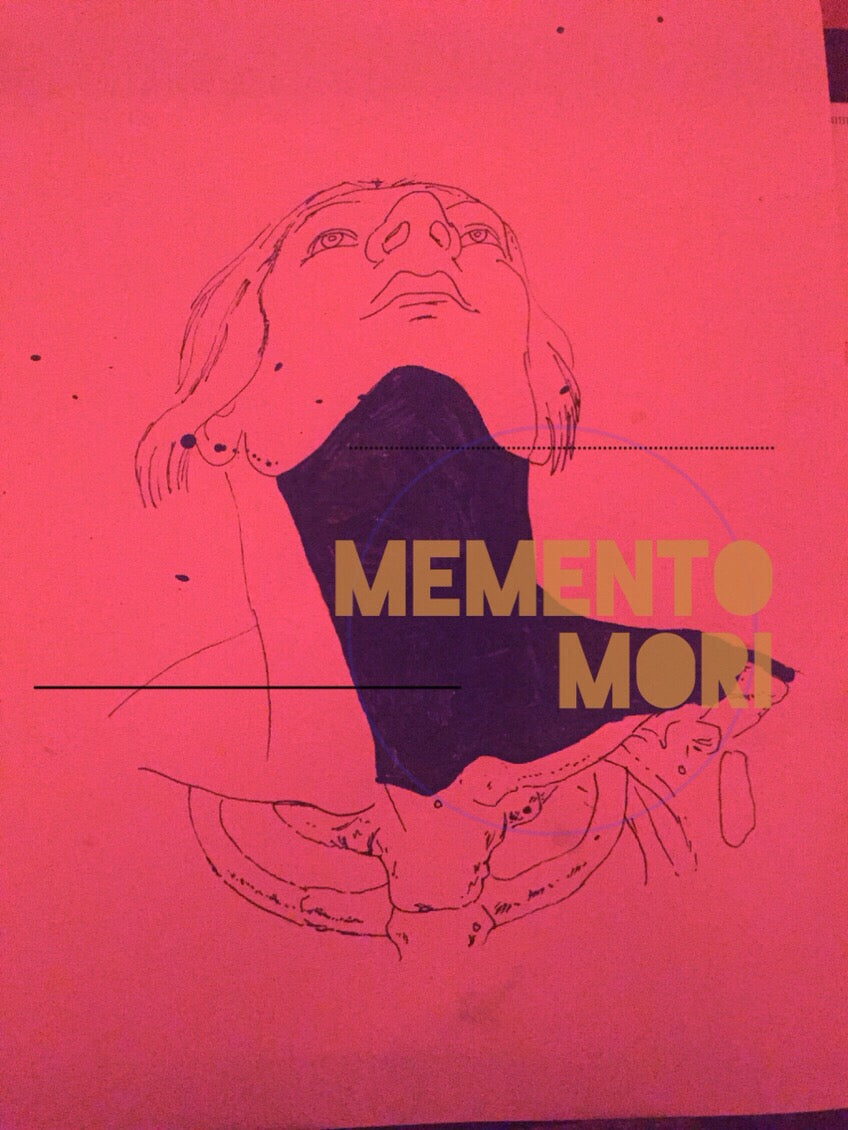
MEMENTO MORI, 2016
At the heart of Memento Mori lies a meditation on trauma, its effects on identity, and the ways it shapes the human experience. The zine uses its title, “Remember you must die,” to set the tone for a deeper reflection on mortality and the fleeting nature of life. It serves as both a personal and collective reckoning with the inevitability of suffering and the recognition that pain is part of the human condition. This reminder of mortality is not meant to dwell on the dark, but to provoke a reflection on life itself—what is lived and what is left behind.
Rather than focusing on the specifics of personal pain or trauma, the zine encourages readers to reflect on their own lives through the lens of universal suffering. It calls for an understanding that while our wounds may be deeply personal, they are never experienced in isolation. Trauma, in all its forms, is a shared human experience, and through this shared suffering, we have the opportunity to engage in healing—not just for ourselves, but for others as well.
The central message of Memento Mori is a shift in perspective: “Stop having pity on yourself and help the other.” This statement challenges the reader to move beyond self-indulgence in pain and suffering. It is not to diminish or invalidate personal trauma, but to reframe it as something that, while significant, should not prevent us from engaging with the world. In a society that often encourages self-care as a form of isolation, Memento Mori urges us to look beyond our own pain and actively seek out ways to care for others. This act of moving outward, of prioritizing the collective over the self, is not only a moral call but also a practical path toward healing. The zine acknowledges that empathy and solidarity are essential in overcoming the isolation that trauma can create.
In this way, Memento Mori critiques a culture that tends to treat trauma as a personal, individual burden. Instead, it offers a vision of trauma as something that, while painful, is a connective force between us all. By focusing on the experience of others, the zine suggests that we might find not only healing for ourselves but also a deeper sense of purpose. This approach acknowledges that we are not defined by our suffering, but by our capacity to move beyond it and contribute to the greater good. The zine becomes a challenge to the viewer: to stop seeing trauma as something that separates us, and to begin recognizing how it connects us in our shared vulnerability.
Moreover, Memento Mori engages with the idea of empathy as a tool for transcendence. The zine points to the human tendency to retreat into isolation in the face of pain, yet it simultaneously encourages us to resist this impulse. In a world that often rewards individualism, Memento Mori is a call to action—an invitation to expand the scope of our compassion, to not just reflect inwardly, but to turn outward and actively seek to alleviate the suffering of others. The zine suggests that this process is not just for the benefit of others, but for ourselves as well. In helping others, we find healing; in lifting others, we are lifted in turn.
Ultimately, Memento Mori is a powerful reflection on the impermanence of life and the way in which trauma shapes our perspectives. It encourages a shift from introspection to action, from self-pity to solidarity. In confronting the universal reality of suffering, it urges us to recognize the fleeting nature of life and the importance of living with compassion, empathy, and a sense of shared responsibility. Through its narrative, the zine challenges us to transcend our own pain and reach out to others in meaningful ways, transforming trauma into a source of collective healing.
